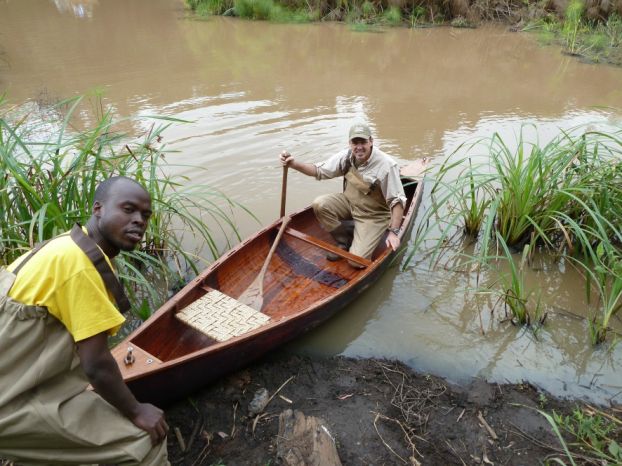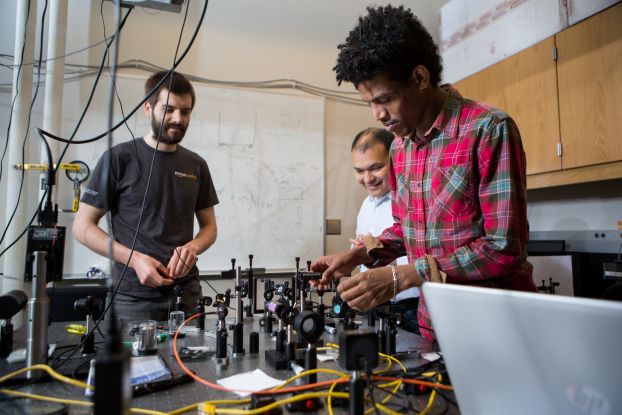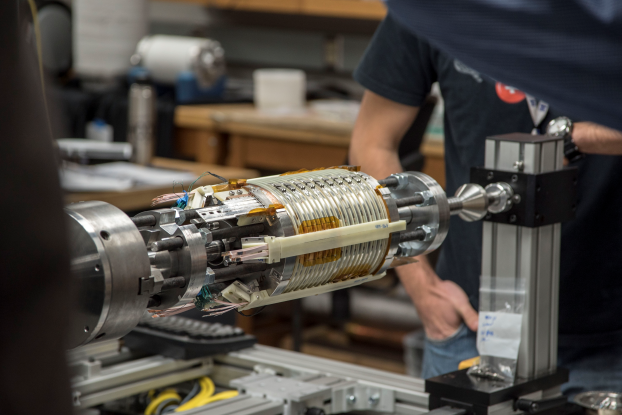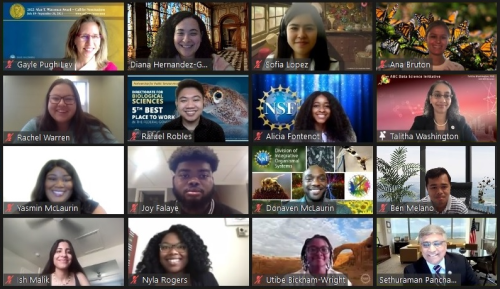Information for principal investigators
This page highlights opportunities that graduate students and recent Ph.D.s can directly apply to.
If you're interested in supporting graduate students with NSF funding, explore NSF's Funding Search page. Most of NSF's funding opportunities allow proposers to include graduate student researchers in their project budget.
Some NSF opportunities focus explicitly on supporting graduate student training through internships and other activities, like NSF's Non-Academic Research Internships for Graduate Students (INTERN) program.
NSF Graduate Research Fellowship Program (GRFP)
The prestigious NSF Graduate Research Fellowship Program supports outstanding graduate students who are pursuing research-based master's or doctoral degrees in STEM — science, technology, engineering and mathematics — or in STEM education.
The five-year fellowship provides three years of financial support that can be used at accredited U.S. institutions. This support includes an annual stipend and a cost-of-education allowance covering tuition and fees.
Applicants must be citizens, nationals or permanent residents of the United States. Applicants must be pursuing full-time research-based master's and doctoral degrees in STEM or in STEM education at accredited U.S. institutions.
Applications are due in the fall of each year. Learn more about the program and how to apply at nsfgrfp.org.
And read NSF 101 for some tips on how to apply.
International Research Experiences for Students (IRES)

NSF's IRES program offers international research opportunities to undergraduate and graduate students.
Participants are mentored by researchers at a foreign lab, allowing them to build their professional network. IRES opportunities usually involve small groups of students who travel to a host institution for a summer-length research project.
Undergraduate or graduate students who are citizens, nationals or permanent residents of the United States are eligible to apply.
Students must contact researchers with IRES funding for information and application materials. Application materials for different IRES opportunities can vary: they may require a statement of purpose, transcripts, reference letters or additional materials.
To find active IRES projects, visit the NSF IRES Project Search. Each project lists the name and contact information of the principal investigator, or lead, of that project.
You can also find many (but not all) IRES opportunities on the NSF Education and Training Application website, where you can prepare and submit applications for IRES and other NSF education and training opportunities.
Computer and Information Science and Engineering Graduate Fellowships (CSGrad4US)

The CSGrad4US program helps bachelor's degree holders return to academia and pursue their research interests in computer and information science and engineering fields.
The three-year fellowship includes a stipend and cost-of-education allowance.
Applicants must be citizens, nationals or permanent residents of the United States who are not currently enrolled in any degree-granting program and have never enrolled in a doctoral program. Applicants must intend to apply for full-time enrollment in a research-based doctoral degree program in a computer and information science and engineering field within two years.
Applications are typically due in the spring or early summer of each year. Learn more about the program and how to apply on the CISE Graduate Fellowships page.
Doctoral Dissertation Research Improvement Grants (DDRIG)
Some of NSF's programs offer grants to doctoral students, allowing them to undertake significant data-gathering projects and conduct field research in settings away from their campus.
The award amounts of these grants vary across programs but typically fall between $15,000 to $40,000 (excluding indirect costs).
Doctoral students enrolled in U.S. institutions of higher education who are conducting scientific research are eligible to apply. Applicants do not need to be U.S. citizens.
These proposals are submitted to NSF through regular organizational channels by the doctoral student's dissertation advisor, with the student serving as the co-principal investigator on the proposal.
Visit NSF's Funding Search to see the list of programs that currently accept DDRIG proposals. Deadlines vary by program: some accept proposals at any time while others have annual or semi-annual deadlines.
Note: Information on the NSF-funded Law and Science Dissertation Grant (LSDG) can be found on the LSDG website.
NSF Research Traineeship Program (NRT)

The NSF Research Traineeship Program gives graduate students opportunities to develop the skills and knowledge needed to pursue a range of STEM careers.
Graduate students funded by the program receive, at minimum, 12-month-long stipends that support their participation in the program's training activities, which can include courses, workshops and research projects.
Graduate students who are citizens, nationals and permanent residents of the United States are eligible to participate as funded trainees in the NRT program. International students can participate as unfunded trainees. Participants must be enrolled in research-based master's or doctoral degree programs.
Students must contact researchers with NRT funding for information and application materials.
To find active NRT projects, visit the NSF NRT Project Search. Each project lists the name and contact information of the Principal Investigator, or lead, of that project.
For more information about the NSF Research Traineeship Program, please contact nrt@nsf.gov.
Mathematical Sciences Graduate Internship

NSF's Mathematical Sciences Graduate Internship program supports summer research internships for doctoral students in the mathematical sciences. These internships are primarily at national laboratories and focus on introducing students to applications of mathematical or statistical theories outside of academia.
Current graduate students pursuing doctoral degrees in mathematics, statistics or applied mathematics are eligible to apply. Participants do not need to be U.S. citizens.
Applications are due in the fall or winter each year. Learn more about the program and how to apply on the internship website.
Summer Scholars Internship Program

NSF's Summer Scholars Internship Program is a 10-week-long summer internship for undergraduate and graduate students. Students participating in the program work in NSF offices that align with their academic interests.
Through the program, interns learn about science administration and how federal policies affect the science and engineering community.
Graduate students and undergraduates who are citizens, nationals or permanent residents of the United States are eligible to apply.
Students interested in the NSF Summer Scholars Internship Program can apply through the following organizations:
For more information on the NSF Summer Scholars Internship Program, please contact nsfssip@nsf.gov.
Applying for a postdoc?
NSF's Postdoctoral Research Fellowships support independent postdoctoral research, allowing fellows to perform work that will broaden their perspectives, facilitate interdisciplinary interactions, and help establish them in leadership positions.
These two- or three-year fellowships provide a stipend and a research and training allowance.
Citizens, nationals and permanent residents of the United States who have recently earned a Ph.D. or will have earned their Ph.D. before beginning the fellowship are eligible to apply.
Current postdoctoral fellowship opportunities can be found on NSF's Funding Search.
Deadlines vary by program: some accept proposals at any time while others have annual deadlines.


